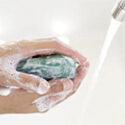Apparently your mom had it right when she threatened to wash your mouth out with soap if you talked dirty. Lying really does create a desire to clean the “dirty” body part, according to a University of Michigan study.”The references to ‘dirty hands’ or ‘dirty mouths’ in everyday language suggest that people think about abstract issues of moral purity in terms of more concrete experiences with physical purity,” said Spike W.S. Lee, a U-M doctoral candidate in psychology, who conducted the study with Norbert Schwarz, a psychologist at the U-M Institute for Social Research (ISR), the Ross School of Business, and the U-M psychology department.The findings of the study, published in the current (October) issue of Psychological Science, support that connection.For the study, Lee and Schwarz asked 87 students to play the role of lawyers competing with a colleague, “Chris,” for a promotion. Each was asked to imagine they found an important document that Chris had lost, and that returning the document would help his career and hurt their own career. Each participant was instructed to leave Chris a message by either voice mail or email, telling him who they were and either lying that they could not find his document or telling the truth that they had found the document.Next, participants rated the desirability of several products as part of a supposed marketing survey and reported how much they were willing to pay for each product. The products included mouthwash and hand sanitizer.Study participants who lied on the phone, leaving an untrue and malevolent voicemail, felt a stronger desire for mouthwash and were willing to pay more for it than those who lied on e-mail. And conversely, those who lied on e-mail, typing the same mean message, felt a stronger desire for hand sanitizer and were willing to pay more for that. Saying nice and ethical things, on the other hand, made it less appealing to clean the body part involved in conveying the message.In scientific terms, the findings showed that “the embodiment of moral purity is specific to the motor modality involved in the moral transgression.” Verbal lying increased participants’ assessment of mouthwash while lying on e-mail, using their hands, increased the assessment of hand sanitizer’s value.”This study shows how ‘concrete’ the metaphorical links are between abstract and concrete domains of life,” Schwarz said. “Not only do people want to clean after a dirty deed, they want to clean the specific body part involved.”
Dirty hands, dirty mouths: U-M study finds a need to clean the body part that lies




Dale Hunt - 1986
Who woulda’ thunk it?
Reply
Eras Cochran - 1947
So are ‘often handwashers’ actually e-mail liars? What about those who wash hands often due to not wanting to infect their problem eyes? That is my reason since August 10th of this year. I’m certain there are thousands of other reasons hands are constantly washed in order to not get infections. The experiment was kind of silly.
Reply